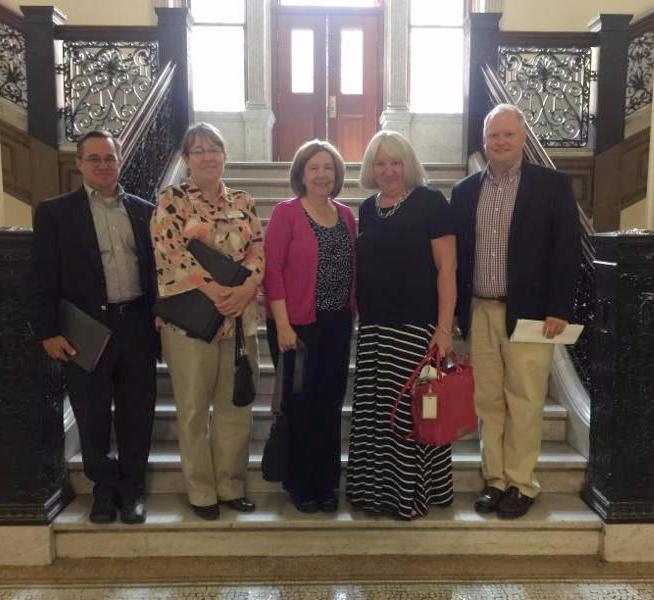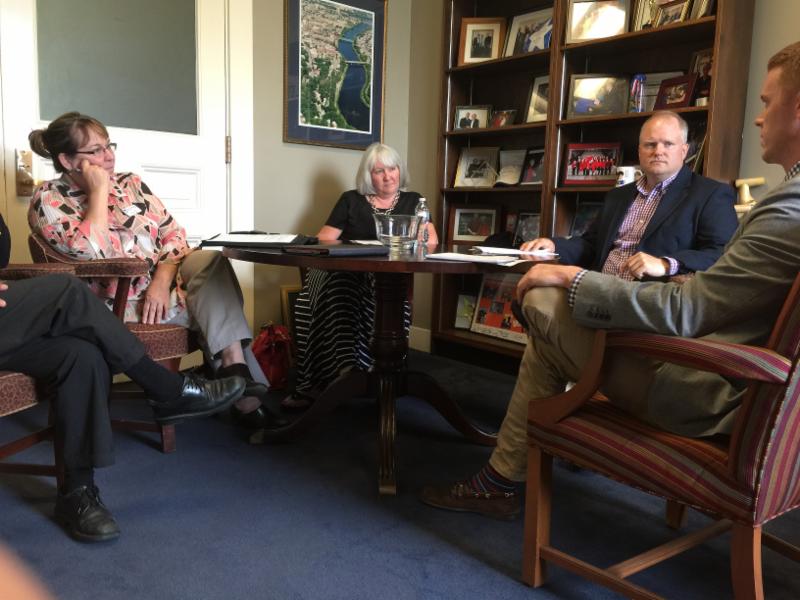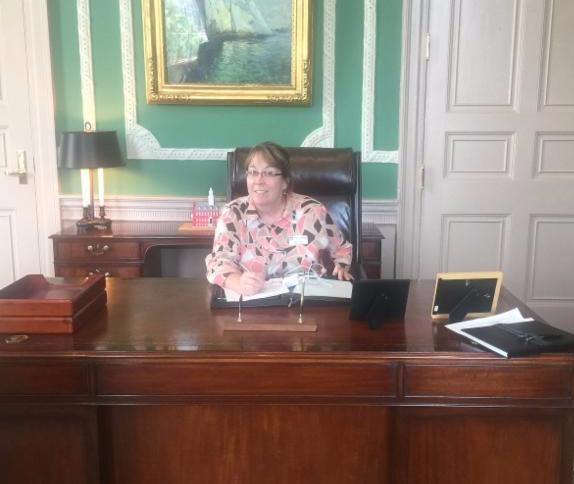New Members
Clean, Affordable, and Reliable Energy
A recap of Hydro Quebec's May Presentation to the Chamber.
 On Tuesday, May 3, the Chamber welcomed Carolyn O'Connor, Director of External Affairs for Hydro Quebec and David Alward, Canadian Consul General, for an illuminating briefing about Governor Charlie Baker's initiatives to meet the Commonwealth's clean energy aspirations through solar, wind, and hydropower. This hotly-contested legislation will ensure that the Commonwealth can rely on a diverse variety of clean, reliable, and affordable energy sources, including hydropower, to supply our electric grid while reducing our dependence on fossil fuels.
On Tuesday, May 3, the Chamber welcomed Carolyn O'Connor, Director of External Affairs for Hydro Quebec and David Alward, Canadian Consul General, for an illuminating briefing about Governor Charlie Baker's initiatives to meet the Commonwealth's clean energy aspirations through solar, wind, and hydropower. This hotly-contested legislation will ensure that the Commonwealth can rely on a diverse variety of clean, reliable, and affordable energy sources, including hydropower, to supply our electric grid while reducing our dependence on fossil fuels.
To ensure that Nashoba Valley and the rest of the Commonwealth have consistent, reliable access to energy sources, it is necessary to put policies in place that allow for the diversification of electricity resources. The upcoming closure of the Pilgrim Power Plant and news regarding the Kinder Morgan Pipeline necessitate that the Commonwealth looks towards alternative energy sources to ensure the majority of our energy does not come from one source. Reliable electric grid systems must maintain reserves that are ready to produce power at a moment's notice. A combination of hydro, wind, and solar resources provide a low-cost and reliable manner through which to diversify energy sources while meeting the Commonwealth's future energy goals. Following the meeting, the Nashoba Valley Chamber of Commerce voted to issue a formal resolution of support for the measure.
As the debate continues on Beacon Hill, the Chamber will keep you apprised on new developments.
On the Docket: Public Policy issues to keep an eye on this summer
Recreational Marijuana
This November, voters across the Commonwealth will vote on the Massachusetts Regulation and Taxation of Marijuana Initiative, a measure that would allow for the use, cultivation, possession, and distribution of certain amounts of recreational marijuana for individuals over the age of 21. The initiative would permit adults to possess one ounce of marijuana outside of their residences and up to ten ounces of marijuana inside of their residences, in addition to limited home growing provisions within a private residence. The initiative allows local control for municipalities to impose limits on where and when marijuana businesses may operate and permits local taxes of up to 2 percent on retail sales, in addition to a 3.75 percent excise tax and 6.25 percent state sales tax.
Recent polls have indicated that public opinion is virtually split as to whether or not to pass the measure, resulting in intense debate from political figures and the media. The initiative has received public opposition from Governor Charlie Baker, Boston Mayor Marty Walsh, Attorney General Maura Haley, the Massachusetts Chiefs of Police Association, Massachusetts Hospital Association, and Massachusetts Sheriffs Association. The Massachusetts Treasury and Special Senate Committee on Marijuana have indicated that the regulatory controls posed by the initiative would require substantial funding mechanisms.
Charter Cap Expansion
Great Schools Massachusetts, a coalition of advocacy organizations, families, and community leaders, has played a critical role in filing a ballot measure entitled An Act to Allow Fair Access to Public Charter Schools. The ballot question would allow the State Board of Elementary and Secondary Education to authorize up to 12 new public charter school each year, with priority given to communities in low-performing districts with demonstrated parent demand. Opponents of the measure have cited that it would drain financial resources from existing public schools.
Although recent polling indicates that lifting the charter school cap has widespread public support, the Massachusetts State Senate recently passed a controversial new version of the charter expansion bill that ties increases in the cap on charter school enrollments to significant funding increases for all types of public legislation. Although the House has yet to debate the bill, House leadership and Governor Baker have expressed deep concerns with the approach taken by the Senate. The Nashoba Valley Chamber of Commerce recently voted to issue a resolution in support of the ballot measure language that would authorize 12 new public charter schools each year.
Common Core Standards
Massachusetts voters will also have the opportunity to weigh in on whether or not the Massachusetts Board of Elementary and Secondary Education should be instructed to remove the statewide Common Core standards for mathematics, science and English language arts. In lieu of these standards, the Governor would create committees comprised of members from private and public research institutions to review previously existing curriculum frameworks and determine if they are equivalent to the standards of educationally advanced nations.
Healthcare Pricing
The Massachusetts Fair Healthcare Pricing Initiative is a ballot initiative that regulates the payments made by private health insurance plans to health care providers to ensure that prices for services are standardized across the industry. If enacted, the initiative would prohibit health plans for entering into or renewing contracts with providers under which the provider would be paid a price for a medical service greater than 20 percent above or ten percent below the average price paid by the health plan for that service. The proposal would not apply to specialty hospitals, geographically isolated hospitals, and hospitals that primarily derive patient revenue from government programs.
The measure has received support from SEIU 1199 United Healthcare Workers East and Steward Health Care. It has been opposed by Governor Charlie Baker, the Massachusetts Hospital Association, and Massachusetts Association of Health Plans.
Cage-Free Eggs
The Massachusetts Farm Animal Containment Initiative, an initiated state statute proposed for the ballot, would prohibit businesses from selling eggs, pork, or veal of a farm animal "confined in a cruel manner", defined as confined to prevent a covered animal from lying down, standing up, fully extending its limbs, or turning around freely. A $1,000 fine would be levied for each violation. The eggs are estimated to costing an additional 12 cents per dozen on the low end to 80 cents more per dozen on the high end. The measure has been supported by a coalition of animal rights organizations and opposed by organizations including the Retailers Association of Massachusetts, Animal Agriculture Alliance, Massachusetts Farm Bureau Federation, and United Egg Producers.
Transgender Public Accommodation Bill
The Transgender Public Accommodation Bill closes a loophole in 2012 Transgender Equal Rights Act to protect transgender people from discrimination in public places like hospitals, parks, hotels, gyms, and theaters. Although the bill (S735, H1577) has widespread support in both the Senate and the House, time is running out to pass the measure due to speculation as to whether Governor Charlie Baker will sign the bill. The Governor was booed off the stage at an LGBT event in mid-April after refusing to indicate whether or not he would sign the proposed legislation if it came across his desk.
Baker Economic Development Bill: Liquor Licensing
This winter, Governor Baker's annual budget proposal included a package of municipal governance reforms, with a notable proposal to give local officials control over the number of liquor licenses that can be granted to restaurants and bars. At present, license quotas lead many communities to petition the Legislature for additional licenses, leading to costly and time-intensive barriers to entry. The proposal has previously received moderate support in the Senate, but has been criticized by Speaker DeLeo in past legislative sessions out of concerns that it would also increase the number of licenses awarded to liquor stores.
Premium Pay on Sundays
Retail is the only industry throughout Massachusetts that is required by law to pay workers time-and-a-half for hourly wages on Sundays. An Act relative to Sunday wages sponsored by Representative Muratore would seek to eliminate this prevision, which has hit retail businesses hard after the minimum wage increase on January 1, resulting in a Sunday starting wage of $15.00/hour. The measure has stalled in committee.
Looking Ahead
Mark your calendar for Beacon Hill Day!
 Join Chamber members on June 8 for our annual Beacon Hill Advocacy Day! We will be meeting with the Chamber's legislative delegation to build relationships and advocate for the Chamber's public policy initiatives. Confirmed participants thus far include Senator Jen Flanagan, Senator Eileen Donoghue, Senator Harriette Chandler, Senator Jamie Eldridge, Representative Jen Benson, Representative Kim Ferguson, Representative Kate Hogan, and Representative Jim Arciero! Additional details on how to RSVP will be sent via email later this month.
Join Chamber members on June 8 for our annual Beacon Hill Advocacy Day! We will be meeting with the Chamber's legislative delegation to build relationships and advocate for the Chamber's public policy initiatives. Confirmed participants thus far include Senator Jen Flanagan, Senator Eileen Donoghue, Senator Harriette Chandler, Senator Jamie Eldridge, Representative Jen Benson, Representative Kim Ferguson, Representative Kate Hogan, and Representative Jim Arciero! Additional details on how to RSVP will be sent via email later this month.

Beacon Hill Day attendees meeting with Legislative Aide to discuss issues

NVCoC's Chairwoman, Julie Crowley of Mt. Wachusett Community College, at the Governor's Desk
Summer Scheduling Changes - No June or July Meetings!
The Chamber's June Public Policy Committee meeting has been rescheduled to accommodate Beacon Hill Day. The June and July meetings have been cancelled.
